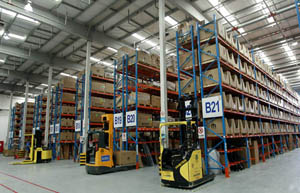A new report on Shanghai's shipping sector has revealed an encouraging set of annual operating figures and also highlighted various issues, particularly regarding the city's free trade zone launched in September last year, which are being addressed as it closes the gap on international rival hubs such as London and Singapore.
The Shanghai International Shipping Center Development Blue Book is the first annual review of the city's shipping industry and includes details on financing, shipbuilding, port services, legal services, insurance and cruise lines operations.
The book reveals Shanghai's overall cargo handling capacity, for instance, expanded to 776 million metric tons by the end of last year, a 5.5 percent year-on-year increase, and predicts a similar rise this year.
Container handling capacity also grew, to 33.62 million 20-foot equivalent units, the standard unit for describing a ship's cargo carrying capacity, a 3.3 percent year-on-year increase by the end of 2013, which the report claims made Shanghai the best performing port for the fourth year running.
"The figures show that as a port and shipping center Shanghai has enhanced its capacities and its importance in the world's shipping industry in recent years," said Zhang Lin, deputy head of the Shanghai Municipal Transport and Port Authority.
Zhang said that given China's opening-up policies and the innovative measures being introduced in the China (Shanghai) Pilot Free Trade Zone-which launched in September last year promising free trade, greater financial opening and fewer government controls in business activities-h(huán)e expected the city to continue to grow its presence as a major international shipping hub in future.
Premier Li Keqiang has said he wants to make the zone a snapshot of how China can upgrade its economic structure.
Some 12,000 firms are reported to have established operations in the FTZ since its launch. It spans nearly 29 square kilometers in the city's Pudong New Area, including Waigaoqiao Free Trade Zone, Waigaoqiao Bonded Logistics Park, Pudong Airport Comprehensive Free Trade Zone and Yangshan Free Trade Port Area.
The book highlighted various measures being carried out by the port that it said will improve its future operations.
Last month, for instance, the government announced it will lift restrictions on foreign investment for 27 types of businesses. Foreign investors are to be allowed to set up solely owned firms in the FTZ for cargo handling and management of container yards. The current regulation only allows Chinese-foreign joint ventures.
A number of restrictive articles in the country's foreign investment guidance catalog are also being adjusted. Solely owned foreign firms will be allowed in sectors that are only open to joint ventures nationwide, such as research and development of facilities for high-speed railways, passenger trains and inter-city rail, designing yachts and luxury liners, as well as development and manufacture of parts of civil airplane engines.
|
 |
 |
| FTZ rents return to normal levels | Small site provides big lessons |
